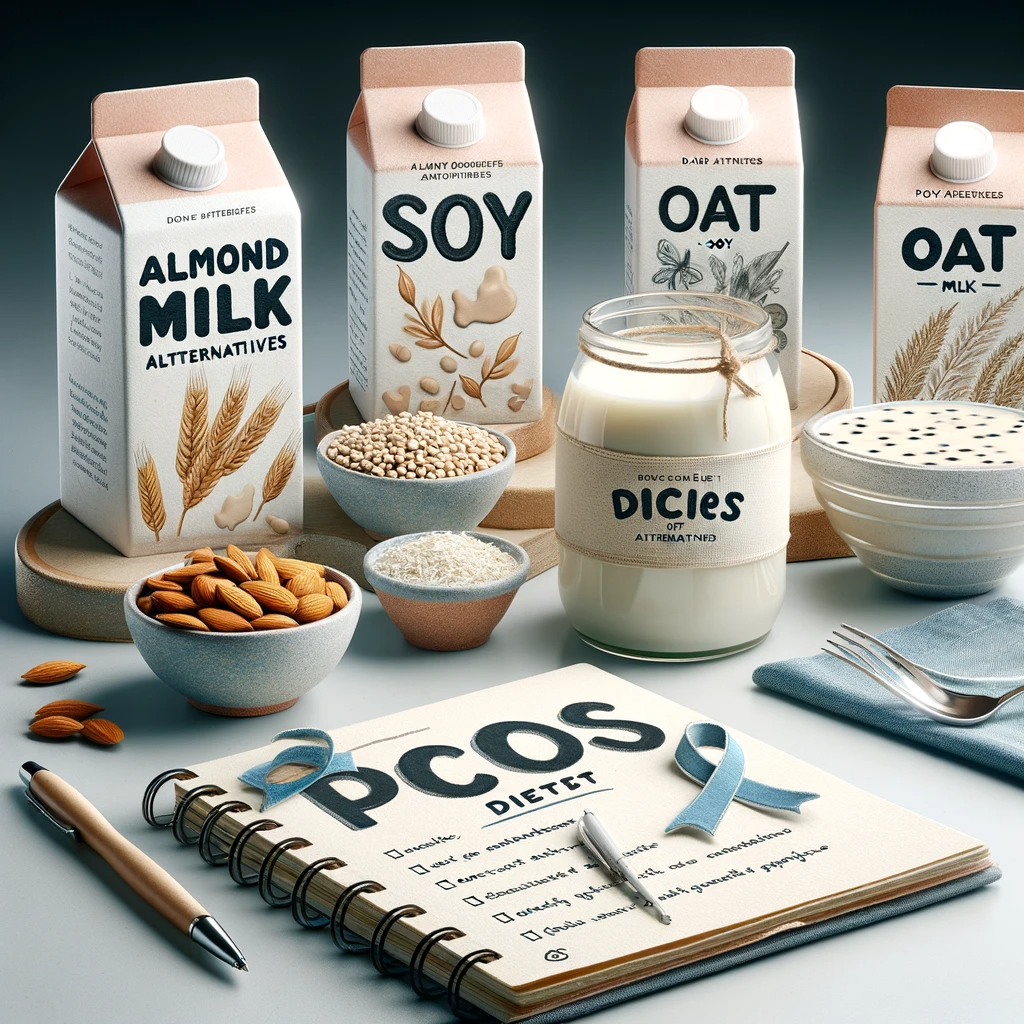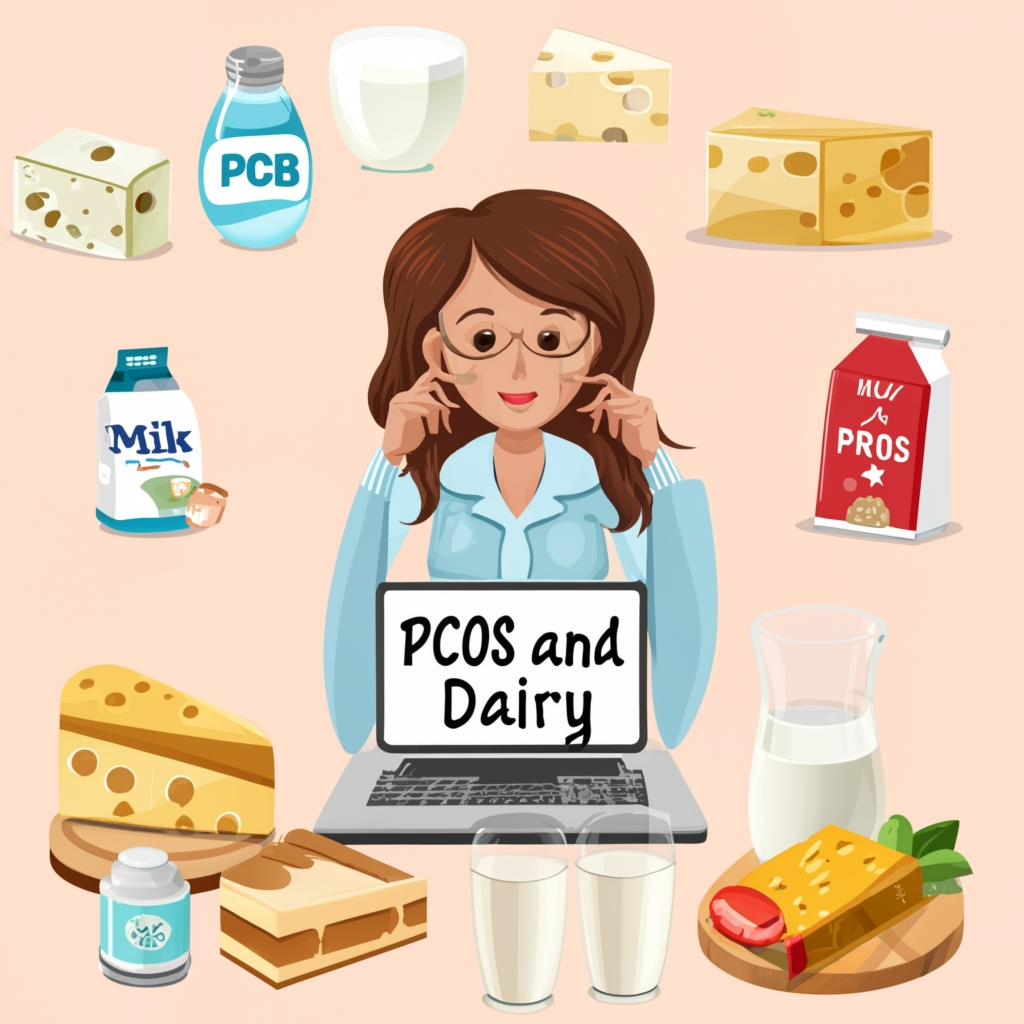Introduction to Dairy and PCOS
Exploring the relationship between Dairy and PCOS (Polycystic Ovary Syndrome) is crucial for women seeking to understand how their diet affects this common hormonal disorder.
Polycystic Ovary Syndrome (PCOS) is a condition that affects a significant number of women worldwide, impacting not just their reproductive health but also their metabolic and hormonal balance. Navigating through the maze of dietary advice can be challenging, especially when it comes to the role of dairy products in the diet of those living with PCOS.
The conversation around dairy and PCOS is complex and influenced by varying opinions and research findings. This section aims to dissect this complexity, providing clear insights into how dairy products might affect those with PCOS. The intricate relationship between diet and hormonal health is critical, particularly in conditions like PCOS, where hormonal imbalances play a central role. Understanding the nuances of this relationship helps in making informed dietary choices, which is crucial for symptom management and overall well-being.
Dairy products, a staple in many diets, come packed with essential nutrients like calcium, vitamin D, and protein. However, they also contain natural hormones and can induce an insulin response, factors that need careful consideration in the context of PCOS. This section will delve into the nutritional composition of dairy products, highlighting both their benefits and potential concerns for individuals with PCOS.
The aim here is not to dictate a one-size-fits-all approach, but rather to empower readers with knowledge. By understanding how dairy products might influence PCOS symptoms, you can make more informed decisions about your diet. This section sets the stage for a deeper exploration into the role of dairy in PCOS management, paving the way for a discussion on alternatives and strategies for individualized dietary planning.
In this journey, remember that every individual’s experience with PCOS is unique. What works for one might not work for another, making personal experimentation and monitoring key components of effective management. As we navigate through the complexities of dairy products and their impact on PCOS, our goal is to provide you with the information needed to make choices that best suit your body and your PCOS management plan.
 Dairy Products: Nutritional Composition and Concerns
Dairy Products: Nutritional Composition and Concerns
Dairy products are often a topic of debate when discussing diets for PCOS management. Understanding their nutritional makeup and potential effects on PCOS symptoms is essential for informed dietary choices.
Hormonal Content in Dairy
- Natural Hormones: Dairy products contain natural hormones, including estrogen and progesterone. These can interact with the hormonal imbalances inherent in PCOS, potentially exacerbating symptoms.
- Effect on PCOS: The presence of these hormones in dairy may influence menstrual regularity and other hormonal symptoms in women with PCOS.
Insulin Response and Dairy
- Insulin Spikes: Dairy, especially those varieties high in sugars (like sweetened yogurts and milk), can trigger insulin spikes. This is a concern for those with PCOS, as insulin resistance is a common issue.
- Managing Insulin Levels: Choosing low-sugar dairy options or moderating intake can help manage insulin levels, a crucial aspect for PCOS management.
Nutritional Benefits of Dairy
- Calcium: Dairy is a primary source of calcium, vital for bone health.
- Vitamin D: Many dairy products are fortified with vitamin D, essential for bone health and immune function.
- Protein: Dairy products provide high-quality protein, important for muscle maintenance and overall health.
- Balancing Intake: While considering the hormonal and insulin effects, it’s important to balance the nutritional benefits dairy offers.
Individual Variability
- Personal Response: The impact of dairy varies greatly among individuals with PCOS. Some may experience worsening symptoms, while others may not notice any change.
- Monitoring Symptoms: Keeping a food diary and monitoring symptoms can help determine personal tolerance to dairy.
The role of dairy in a PCOS diet is multifaceted. While dairy products offer essential nutrients like calcium, vitamin D, and protein, they also contain natural hormones and can affect insulin levels, which are crucial considerations for women with PCOS. The key is to understand and monitor how your body reacts to dairy, adjusting intake based on personal health goals and symptom management. This personalized approach allows for a diet that supports overall well-being while addressing the unique challenges of PCOS.

The Debate: Dairy’s Impact on PCOS
The relationship between dairy products and PCOS is a topic of ongoing debate. This section explores the potential effects of dairy on PCOS symptoms, considering both the scientific perspectives and individual experiences.
Potential Hormonal Impact
- Hormones in Dairy: Dairy products contain bioactive hormones, which can potentially influence the hormonal imbalance in PCOS.
- Exacerbating Symptoms: For some women with PCOS, these hormones may worsen symptoms such as irregular periods, acne, and hair growth.
- Research Evidence: Studies show varied results, with some indicating a worsening of symptoms and others showing no significant impact.
Inflammation and PCOS
- Role of Inflammation: Chronic inflammation is a key factor in PCOS, contributing to insulin resistance and hormonal imbalance.
- High-Fat Dairy Products: Certain high-fat dairy products are believed to contribute to inflammation, potentially aggravating PCOS symptoms.
- Choosing Low-Fat Options: Opting for low-fat dairy may help reduce this inflammatory response, though individual responses can vary.
Individual Variability in Dairy Impact
- Diverse Responses: The effect of dairy on PCOS symptoms can differ significantly from person to person.
- Personal Experimentation: It’s important for individuals to observe their own body’s response to dairy consumption.
- Symptom Monitoring: Keeping track of changes in PCOS symptoms in relation to dairy intake can provide valuable insights for dietary adjustments.
Dairy Alternatives and Management Strategies
In light of the potential issues with dairy, exploring alternatives and management strategies is crucial for individuals with PCOS.
Plant-Based Alternatives
- Milk Substitutes: Almond, soy, and oat milk are popular dairy-free alternatives, offering varied nutritional benefits.
- Cheese and Yogurt Alternatives: Plant-based cheese and yogurt options are increasingly available, catering to those reducing dairy intake.
Calcium-Rich Non-Dairy Foods
- Leafy Greens: Spinach, kale, and collard greens are excellent sources of calcium.
- Nuts and Seeds: Almonds, chia seeds, and sesame seeds are not only rich in calcium but also in other nutrients beneficial for PCOS management.
Monitoring and Personalization
- Observing Effects: Regularly monitoring how different foods, including dairy alternatives, affect your PCOS symptoms is key.
- Customizing Diet: Tailoring your diet based on these observations can help in better managing PCOS symptoms.
Comprehensive Management of PCOS
Managing PCOS effectively involves a holistic approach that goes beyond just dietary choices.
Lifestyle and Diet
- Balanced Diet: A diet rich in fruits, vegetables, lean proteins, and whole grains supports overall health and PCOS management.
- Regular Exercise: Exercise can help in weight management and improving insulin sensitivity, both important for PCOS.
Professional Guidance
- Healthcare Consultation: Seeking advice from healthcare professionals can provide personalized dietary and lifestyle recommendations.
Ongoing Research
- Emerging Studies: Continuous research is essential for understanding the complex relationship between dairy products and PCOS, aiding in developing more effective dietary guidelines.

The debate surrounding dairy’s impact on PCOS highlights the need for individualized dietary approaches. While some may find dairy exacerbates their symptoms, others may not experience any negative effects. The key is personal experimentation, monitoring, and professional guidance to find a dietary balance that works for each individual’s unique PCOS journey.
Personalized Approach to Dairy in PCOS
Adopting a personalized approach to dairy consumption is crucial for women with PCOS. This section explores how to balance dairy’s potential benefits and risks, and emphasizes the importance of individualized dietary choices in managing PCOS effectively.
Evaluating Personal Dairy Tolerance
- Individual Responses: Recognize that dairy impacts each person with PCOS differently; what aggravates symptoms in one might be harmless or even beneficial for another.
- Trial and Error: Experiment with different types and amounts of dairy to assess personal tolerance.
- Symptom Tracking: Use a diary or app to track changes in PCOS symptoms in relation to dairy consumption for a clearer understanding.
Balancing Dairy’s Nutritional Benefits and Risks
- Nutrient Considerations: Weigh the nutritional advantages of dairy, like calcium, protein, and vitamin D, against potential hormonal and inflammatory risks.
- Moderation is Key: For some, moderate dairy consumption might strike the right balance between getting essential nutrients and managing PCOS symptoms.
- Consulting Dietitians: Seek advice from nutrition experts, especially when unsure about the right balance for your condition.
Managing Dairy Intake in PCOS
- Low-Sugar Dairy Products: Opt for dairy products with minimal added sugars to avoid exacerbating insulin resistance.
- Organic and Hormone-Free Options: Consider organic and hormone-free dairy products, which may have lower levels of bioactive hormones.
- Cheese and Yogurt: Hard cheeses and Greek yogurt, which are lower in lactose, might be more tolerable for some women with PCOS.
Integrating Dairy Alternatives
- Plant-Based Milk: Experiment with various plant-based milks to find ones that suit your taste and nutritional needs.
- Calcium-Fortified Products: Choose dairy alternatives fortified with calcium and vitamin D to maintain adequate nutrient intake.
- Whole Food Sources: Rely on whole foods like leafy greens, nuts, and seeds for calcium and other nutrients.

Lifestyle Integration
- Comprehensive Lifestyle Approach: Managing PCOS effectively goes beyond dietary choices, encompassing exercise, stress management, and overall lifestyle.
- Exercise Regimen: Incorporate regular physical activity to improve insulin sensitivity and hormonal balance.
- Stress Reduction Techniques: Practice stress-reduction methods like yoga, meditation, or mindfulness, as stress can impact hormonal balance and PCOS symptoms.
Concluding Thoughts
Navigating dairy consumption in the context of PCOS is a highly individualized journey. It requires understanding the potential impacts of dairy on your specific symptoms, balancing its nutritional benefits against any risks, and integrating this knowledge into a comprehensive lifestyle approach for managing PCOS. This personalization helps address the unique aspects of your PCOS and supports your overall health and well-being.

Conclusion: Embracing a Holistic Approach to PCOS and Dairy
In concluding our exploration of dairy’s role in PCOS management, it’s clear that the journey is deeply personal and multifaceted. This final section encapsulates the key insights and provides guidance on adopting a holistic approach to managing PCOS, with a focus on dietary choices, including dairy consumption.
Understanding Dairy’s Dual Role in PCOS
- Varied Effects: Acknowledge that dairy can have both beneficial and adverse effects on PCOS, depending on individual hormonal profiles and health conditions.
- Nutritional Value: Remember that dairy provides essential nutrients but also consider its potential to influence insulin levels and hormonal balance.
Personalized Dairy Consumption Strategy
- Self-Monitoring: Regularly assess how dairy affects your PCOS symptoms and overall health.
- Adaptation and Modification: Be willing to adapt your dairy intake based on your observations and changes in your condition.
- Seeking Balance: Strive for a balanced diet that includes or excludes dairy based on your personal health needs and preferences.
Integrating Dairy Alternatives
- Exploring Options: Experiment with dairy-free alternatives to find those that suit your dietary needs and preferences.
- Nutrient Density: Ensure that your choices are dairy-free and nutrient-rich, offering the necessary vitamins and minerals.
Beyond Diet: A Comprehensive PCOS Management Plan
- Lifestyle Modifications: Emphasize the importance of a holistic lifestyle approach, incorporating regular exercise, stress management, and adequate sleep.
- Medical Consultation: Continuously engage with healthcare professionals to tailor your PCOS management plan, especially when considering significant dietary changes.
- Community Support: Consider joining PCOS support groups for shared experiences, tips, and encouragement.
Emphasizing Continuous Learning and Adaptation
- Staying Informed: Keep up-to-date with the latest research and developments in PCOS management, including dietary recommendations.
- Openness to Change: Be prepared to adapt your approach as new findings emerge and as your body and health needs evolve.
Final Thoughts
In conclusion, managing PCOS is a dynamic process that requires a personalized and informed approach. Understanding how dairy fits into your PCOS management plan is a key aspect of this. By balancing the benefits and potential drawbacks of dairy, exploring alternative options, and integrating these choices into a broader lifestyle and health strategy, you can effectively navigate the complexities of PCOS. Keep in mind that the goal is not just to manage symptoms but to enhance overall health and quality of life.
FAQ Section
Q1: Is dairy bad for all women with PCOS?
- A: Dairy’s impact on PCOS varies among individuals. While some may experience worsened symptoms, others might not notice any adverse effects. It’s important to monitor your body’s response to dairy and adjust your diet accordingly.
Q2: Can dairy worsen acne in PCOS?
- A: Dairy has been linked to acne in some studies, possibly due to hormones present in milk. However, this varies among individuals. If you seem to notice an increase in acne after consuming dairy, you might consider reducing your intake.
Q3: What are the nutritional benefits of dairy for PCOS?
- A: Dairy is a good source of calcium, protein, and vitamin D. These nutrients are important for bone health, muscle maintenance, and overall well-being. Balancing these benefits with any potential adverse effects is key.
Q4: Are there any dairy alternatives recommended for PCOS?
- A: Yes, alternatives like almond milk, soy milk, and oat milk can be suitable substitutes. Also, leafy greens, nuts, and seeds are great non-dairy sources of calcium.
Q5: How much dairy is safe for someone with PCOS?
- A: There’s no one-size-fits-all answer. Some may tolerate moderate amounts of dairy without any issues, while others might need to limit or avoid it. Monitoring your symptoms can help determine the right amount for you.
Q6: Does dairy consumption affect insulin resistance in PCOS?
- A: Dairy products, especially those high in sugars, can potentially exacerbate insulin resistance, a common issue in PCOS. Choosing low-sugar dairy options or moderating intake can help manage this aspect.
Q7: Should I completely eliminate dairy from my diet if I have PCOS?
- A: Not necessarily. It depends on how dairy affects your individual symptoms. Some women with PCOS can tolerate dairy in their diet without any adverse effects.
Q8: Is organic or hormone-free dairy better for PCOS?
- A: Organic and hormone-free dairy products may have lower levels of bioactive hormones, which could be beneficial for those with PCOS. However, individual responses can vary.
Q9: Can lifestyle changes complement dietary management of PCOS?
- A: Absolutely. Alongside dietary management, incorporating regular exercise, stress reduction, and a balanced diet can play a vital role in managing PCOS effectively.
Q10: Is professional guidance necessary for managing PCOS and diet?
- A: Consulting with healthcare professionals, particularly for personalized dietary advice, is beneficial. They can help tailor a diet plan to your specific needs and health goals.
Resources:
PCOS RECIPES COOKBOOK: Click Here To Get It!


 Dairy Products: Nutritional Composition and Concerns
Dairy Products: Nutritional Composition and Concerns
